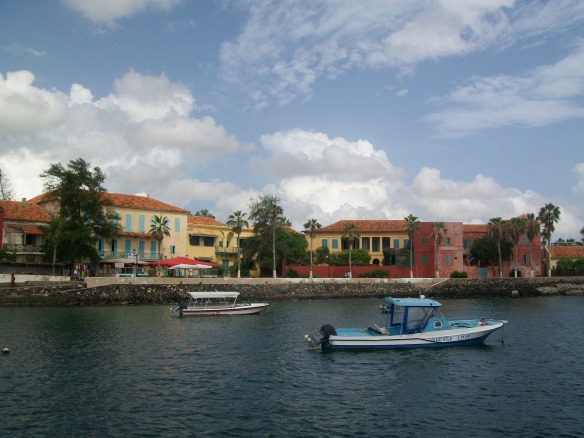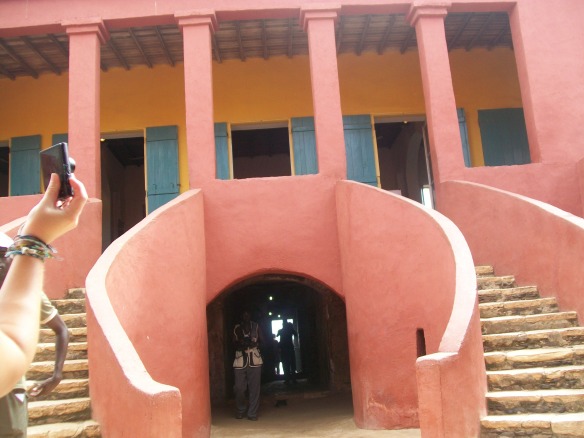Having gone to Ile de Goree ( Goree Island) today was quite a sentimental experience that really hit home for me. It’s like Senegal is getting more emotional than I thought or ever even expected.

My view from the ferry gave me the impression that this island had a lot to offer, starting with its cleared- water beaches and the well-decorated canoes that rested on its shores. The heat was getting to its highest point as I put on my shades and got off the ferry. The tour guide introduced himself and got to walking as we followed. He explained a few statues and monuments dedicated to people on the island, but it wasn’t until we reached ” la maison des esclaves” ( the slave house) that I completely understood the purpose of Goree island and its importance to the black race and even to the rest of the world.

See, the house in which I stood today, was where my ancestors were put after being “captured”. Not only were they put there, but I got to enter the cells in which they were treated like animals waiting to be transported across the ocean to the New World. One of the cells was called the “weighting cell” which is where every slave was put on a scale and weighted. See, to qualify to be sold, you had to weight at least 60 kg, if not you were placed in another cell where you were forced to eat to attend the 60 kg to be sold. Then there was a small cell where all men were placed, chained together, waiting for the boat which would bring them to the colonies. No bathroom, no windows, nothing. If they had to use the bathroom, well the floor of the cell in which they were put was where it all happened. After that, there was the virgin cell in which they placed virgin girls. These girls were sold at a higher price, and sometimes the white men would pay to just take their virginities. O wait, without their consent! Rape much? Then there was the women’s cell, where women and non-virgin girls were placed, waiting for the embarkment boats as well. I then entered the little space, which was less than half my height. I was confused. What could the purpose of that small little space have been? Did they happen to have guarding dogs? Then I read it : “punishment cell”. In this cell, in which I could not even fit at 5 ft 7, they used to throw a bunch of what the white man considered “violent slaves”. Mmm I wonder what could have turned these HUMANS forced to abandon their cultures, families and freedom to become slaves into “violent” creatures?

I continued on and made my way to the “door of no return” which gave a view of the ocean being no more than three feet away. I guess you can take a very wild guess of what happened through that door. If you cannot figure it out, let me help you a bit.

That was the door where whenever a slave walked through it, he would not be back. Hence, its name since it opened to the ocean. Either the slave that was thrown on a boat ( they usually were all enchained together and forced on the boat with guards waiting to shoot them if they didn’t get on the boat) or they were sick slaves which were dropped in the Atlantic to the sharks so they would not contaminate the other slaves and ruin the white man’s profit. If a slave tried to commit suicide by jumping in the water instead of getting on the boat, he was shot by the guards so he wouldn’t drag the other slaves with him as they were all chained together.
I became overwhelmed. So many thoughts, so many emotions, but no one to share them with, no one to sympathize with, as I was surrounded by white students who I thought would not understand how I feel. It was different. Their emotions about this place had to be different than mine. Even if they sympathized, they wouldn’t understand. They couldn’t possibly be feeling the way I was feeling. That’s when I realized that as much as society tries to move forward we are not the same. Our past in not the same.
Even I just dont understand. Do people really expect us to leave all of that behind and move on like it never really happened? Sometimes I just want to go back 3-4 centuries and ask the Europeans what went through their heads?! Did you really think it was ok to torture, enchain, beat, and work to death another HUMAN BEING? A human being just like you who has emotions, feelings and blood running through their veins? Did you really think it was ok because their darker skin was different than yours? What were you thinking? I was angry.
I think the next part of my tour of Goree affected me spiritually. I grew up as a Catholic girl, went to the best private Catholic School in Haiti until the age of 12. But today, I questioned my religion. I know for a fact that there is a higher power, a higher person looking over me, something bigger than me because other wise I can honestly tell you I wouldn’t be where I am today, I wouldn’t even be alive. Of that, I am definitely certain! But religion, I’m not too sure I believe in it and I am positive it is man- made and this is why… As I sat in the church which was built on Goree for the white and mulatto missionaries who were themselves slave owners or sellers, I couldn’t help but wonder why God didn’t stop it? The slave house was only a few feet away from the church! Why didn’t He give the white man a sign which would make them understand that skin color doesn’t make or break a person. Why wasn’t He there? Where was He? If the white missionaries spent so much time in church, why didn’t God speak to their hearts? Why didn’t the Good Book teach them something? Just why did he let slavery go on for so long? Why?
I guess these questions will never be answered, now will they? At this point I had found my face covered in tears as I felt numb. So many emotions were felt but I was mostly filled with anger. I felt something I had never felt before: hatred. hatred for the white race’s ancestors. Hatred for the mulattos who felt like they were better than the people whose same blood was running through their veins. Hatred for the african chief villages who picked out their own people and offered them to the white man in exchange for beads and necklaces.

This mistake, this wound that has been created in history could NEVER be healed. But we must move forward, while remembering our past. I say this because I fear that one day, black people will forget where they came from, I fear that they are not living up to their potentials and letting history determine their future. Even though there are still plenty of agony against my black race, I know that our ancestors did not fight in vain, so why shame them? Whatever happened to “we can overcome”? We’ve overcame a lot as a race, why not continue to move forward instead of regressing? Yes, history has affected us deeply and I was certainly reminded of that today. I just want us to be able to create that better future of which our ancestors dreamed for us as they fought hard for our freedom and our rights.

And as the tour of the Goree Island continued and the tour guide explained the struggle of my people, and brought up Toussaint l’Ouverture, I couldn’t help but to be proud of being not only a black woman, but more specifically a HAITIAN woman. A woman whose ancestors were the first to fight and succeed against this abuse of the mind, body, spirit and most importantly and abuse of their culture. A woman who’s ancestors decided to step out of the cave to show the world the wrongs of slavery.
Even though I felt some sort of anger based on the emotions I was feeling, I still had to remind myself this is not just a race issue. It goes deeper than race and some people will not admit it. I still had to remind myself that we are all one race, whether Black, White, Hispanic, Asian…We are all HUMANS. And that should count for something that unites us all rather than divide us. It is up to ALL of us to create a better future where racism, bigotry, prejudice should be eradicated. If we do not collaborate to make such changes, who will? We choose to sit around and wait on someone else to make the changes that we ALL are capable of making in this world. Why should we wait when we have what it takes? Everyone in this world has the power to step out of the cave and walk into the light to see the world in a different perspective. Then they can enlighten the others who are still living in the dark. It only takes one person to influence the rest. I am afraid to say that this battle against injustice is not over as the third-world countries, the people living in communities whose voices are not heard, the people even living in developed countries who struggle on a daily basis, they all countinue to struggle under this same of oppression. One of the recent quotes by the author Kevin Bales stated “The criteria of enslavement today do not concern color, tribe or religion; they focus on weakness, gullibility and deprivation”. Clearly, slavery is not over, it simply exist under a different form and I truly believe that everyone of us have the power to eradicate such wickedness.
ps: This post was not written in any way to get you to feel pity for the black race, it was not written for black people to feel sorry for themselves. I went through some emotions I had never felt before even when I have studied slavery in school for many years. It was just different to be experiencing this and seeing those places. I wanted to share my emotions and experiences, write them and voice them to enlighten you on issues that occurred and still occur in this world, to enlighten you on issues that most of us choose to remain oblivious to. What I want you to do is take a deep look at yourself and ask “What am I doing to make the world a better place? How can I help get rid of the injustice going on?” So that way, you can choose the way you influence others wisely.









